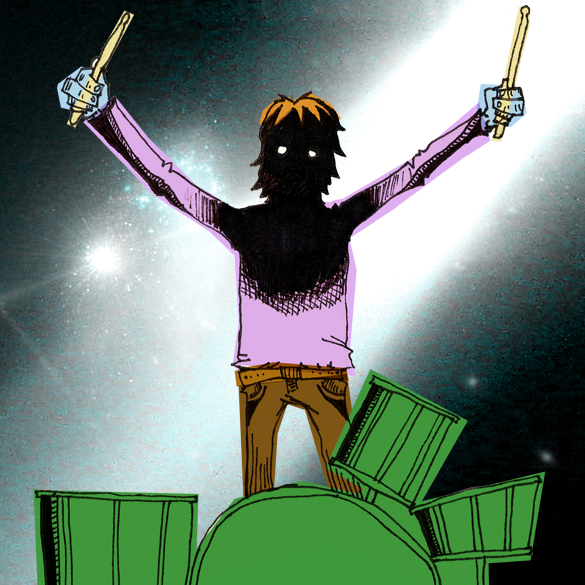“I’ve seen you in the mirror where the story began…” ~ Johnny Rotten
At the age of fourteen, to the chagrin of my parents, I dyed my already bleach-blonde hair bright green. I did so not out of some misguided notion that the color was flattering for my skin tone (it wasn’t), but because after reading John Lydon’s autobiography Rotten: No Irish, No Blacks, No Dogs, and learning that green was the first color he had dyed his hair, I felt it was the only way forward with my life.
Like so many newly-minted teenagers, I latched onto the Sex Pistols as soon as I heard the opening chords to “Holidays in the Sun.” I found myself enamored by the Pistols’ sneering postures, their declarations of absolute laziness, and with Rotten’s snotty, ragged voice. Believing I had found my calling, I formed a band with my best friend and did everything I could to sound more English. We adhered staunchly to the punk rock saying of “here’s a guitar, here are three chords, start a band,” and in an attempt to channel the utter disdain of the Sex Pistols, I took it upon myself to be as offensive and wild as possible at every show we played. Not surprisingly, we were never very popular, and like our heroes before us, we eventually burned out.
All of this occurred before I had any context in which I could understand or interpret the Sex Pistols. In my teenage eyes, they were divorced from any true reality and existed simply as a force of wild aggression. Instead of learning from them, I went through the steps every teenager must and simply indulged in them. And, like countless friends around me, I bought the myth that their magic could be recreated through three poorly struck chords. I bought the myth that punk was a thing of simplicity.
The tale of the Sex Pistols, however, is anything but simple. Fittingly similar to punk music itself, it’s hard to pinpoint the exact moment when the band was born. Steve Jones and Paul Cook, the guitarist and the drummer respectively, had played together both as the Strand and the Swankers since 1972. Both boys were interested not only in the culture of rock music, but in the aesthetic. They spent their time loitering outside of a shop known as Too Fast to Live, Too Young to Die which was owned by Malcolm McLaren and Vivienne Westwood, two eccentric and self-styled English fashion designers. By 1974, the boys had caught McLaren’s attention and came under his management. McLaren’s first act as manager was to recruit an art student named Glen Matlock to play bass for the band. Following that, he changed the name of his shop to Sex, began designing S&M inspired clothing, and promptly moved to New York City. The Strand was left to wait.
Stateside, McLaren was exposed to the wild imagery of figures like Richard Hell and Johnny Thunders. Hell, a drug addled poet who bounced from band to band, confronted McLaren with some of the most stimulating fashions the designer had ever seen. Clad in exceptionally tight, black jeans, Hell often walked around in fraying shirts held together with safety pins. At a time when every musician worth knowing had grown their hair long, Hell had cut his short and styled it into perfect disarray. Thrilled by what he saw, McLaren immersed himself in the New York music scene, stepping in to manage the New York Dolls (of which Johnny Thunders was a member) as they wobbled on their last legs. McLaren revamped their image: dressing them in red rubber outfits and flying communist flags behind them. But for a band already crippled by drug use, the overt communist imagery was too much. While McLaren would later perfect the image of a political band with the Sex Pistols, the New York Dolls broke up in 1975. In the aftermath and plagued with venereal disease, McLaren moved back to England, confident that in the tattered images of Richard Hell and the New York Dolls, he had seen the future of rock ‘n’ roll.
McLaren now knew the Strand needed a front man. They needed someone who could capture the visceral aesthetics he had discovered in New York. Singers were auditioned, many failed. McLaren even tried to recruit Richard Hell to move to England and front the band, but Hell turned him down. It wasn’t until they came across an odd and slightly hunched boy named John Lydon, wearing a homemade I HATE PINK FLOYD t-shirt, that progress was made. At Sex, Lydon auditioned for the role by singing Alice Cooper’s “I’m Eighteen.” He won McLaren’s heart, was dubbed Johnny Rotten, and the rehearsals began.
The Sex Pistols escalated from there. They played an increasing number of shows, covering songs from the Who and the Small Faces with surprising aptitude. A group of teenagers (including future notables like Billy Idol and Siouxsie Sioux), known as the Bromley Contingent, began following the Pistols from gig to gig, showing support and fervor. Soon, fledgling acts like the Damned and the Clash were opening for them, inspired by the Pistols’ strangled take on rock ‘n’ roll. Finally, on September 1st, 1976, the band performed a new track, “Anarchy in the U.K.,” for their first televised appearance on the program So It Goes. Come October, they had a record deal.
These details—far from the most salacious or captivating tales from the band’s history—serve to highlight that the Sex Pistols were a more complex and premeditated band than many of their detractors might give them credit for. Yet how odd that I would have to argue that the Sex Pistols were a band interested in planning and trajectory when the main criticism against them is that they were pre-planned. Teenage punks attempting to justify why they dislike the Pistols delight in nothing more than labeling them a boy-band, a group of puppets corralled by the ever-cunning McLaren. And while that statement is only half true, it’s certainly worth embracing.
On the one hand, it is undeniable that McLaren was the ever-present fifth member—silently working in the background on the band’s direction as the Pistols sat on talk shows, calling the host a “dirty bastard…you dirty fucker.” But the rather tired debate amongst teenage punks of “were the Sex Pistols authentic or not?” seems to me to be the least interesting question you could ask about the band. Of course it was an act. Rotten admits to as much in the song “I Wanna Be Me,” where he howls “You didn’t fool me, but I fooled you!” What we should be looking at is the way the Sex Pistols digested influences. I don’t care about their authenticity; I care about how the Sex Pistols, in numerous ways, acted as distorted mirrors facing and reassembling the American coast.
The (eventually bitter) success of the Sex Pistols comes from their appropriation of culture and their willingness to indulge in but never admit to theatrics. When McLaren came back from America, dreaming of Richard Hell’s drug-warbled poems and Johnny Thunders’ glittering trash-decadence, he returned to find a band willing to drink the American Kool-Aid. Steve Jones, when speaking to the Swedish tabloid Expressen in July of 1977, said “I think the New York Dolls turned me on to [my desire to be in a band]. I saw them supporting the Faces and I’d never seen anything like it. Musically they were bad, but really exciting, really mad.” [1] When he made it back to English shores in 1975, McLaren offered the group the opportunity to recreate an American phenomenon in an exceptionally Anglicized fashion. Steve Jones, Paul Cook, and Glen Matlock were happy to oblige.
Even Johnny Rotten, who notoriously refuses to acknowledge much of his musical influence or inheritance, did not walk away from McLaren’s American visions unscathed. For the Sex Pistols’ raucous debut album Never Mind the Bollocks, Here’s the Sex Pistols, released in October of 1977, Rotten wrote the song “New York” about the New York Dolls, attempting to disavow their influence. Of course the ironic result is a song dependent on the New York Dolls in the most direct way possible. Another song from the album “Pretty Vacant,” also owes its genesis to New York, with the Pistols having allegedly written it as their own version of Richard Hell’s iconic song “Blank Generation.”
For so many elements of New York to exist on one of the most English albums ever recorded is a captivating example of hybridity. Though the truly intriguing part about these hints and whispers is the way in which the Sex Pistols attempt to hide them. These fingerprints from New York become spectral, lingering in the background of the album only if you know to look for them. “New York,” regardless of Rotten’s anti-Dolls lyrics features guitar play from Steve Jones that emulates Johnny Thunders’ techniques with devotional precision. The only difference is that the song moves at a tempo and with a vocal delivery entirely divorced from the America blues-drawl of the Dolls. Where the New York Dolls sang about girls and drugs, the Sex Pistols sang about class and apathy. As Richard Hell crooned poems about landscapes and hallucinations, the Sex Pistols sneered about abortion. Interestingly enough, however, both Hell and the Pistols penned a track for their debut albums attacking record labels that had done them wrong (Hell’s “Liars Beware” and the Pistols’ “EMI”).
All of these similarities are not to say that the Sex Pistols were purely imitations. Rather, it’s a gesture to point out the calculation that went into the band. While McLaren did seek to model the Pistols after Richard Hell in many ways, he also wanted them to be understood as English. He and the band coordinated this concept through several different means. Whenever they borrowed one of Hell’s aesthetic choices, such as torn or safety pinned clothing, they transferred it to distinctly English styles of dress. They would exchange the Dylan-esque black boots of New York for brothel creepers. And instead of having the band’s image coalesce around drag or poetry (two touchstones of the New York scene), McLaren encouraged them to turn their eyes towards the political spectrum. Knowing drag and drugs would not shock English listeners in the way it had in America, the Sex Pistols snarled about anarchy and impotent monarchs, crafting themselves as violently subversive characters. In retrospect, it becomes clear they were practicing a well crafted, theatrical embellishment of the deviance McLaren had seen in New York. Whether they intended to follow through with their political message is almost beside the point.
However, even with the tightly calculated trajectory of the band, there was a healthy dose of debauchery and violence. In January of 1977, the Pistols were dropped from their label EMI under the allegations that they had vomited and caused panic on an airplane while hungover and touring. They responded by ejecting Glen Matlock from the band (with McLaren claiming it was because Matlock liked the Beatles) and recruiting Sid Vicious to pantomime his parts on bass. In June, they played a concert mocking the Queen’s Silver Jubilee, resulting in the arrest of McLaren and the fleeing of the band. Later that same month, Johnny rotten was attacked on the streets by a group wielding knives and left with tendon damage in his arm. He was attacked again three days later. But the chaos was, if not controlled, intentional. It was the danger and other-ness of New York proto-punk taken to an extreme—and that extreme was exactly what the Sex Pistols sought to engineer, and that they perhaps found most prominently in Sid vicious.
When Vicious entered the band in February of 1977, he could barely play his instrument, but was generally described as a nice kid. All of this changed rather rapidly, however, when he became involved with a woman named Nancy Spungen, a New Yorker with a nasty drug problem and an interest in bedding musicians. The tragedy of Sid Vicious, his eventual addiction, and his persona, is that he was the uncontrollable yet logical culmination of the Sex Pistols’ carefully constructed machine. As a member of the band, he took it upon himself to embody the utter destruction and disorder the Sex Pistols evoked—and disorder, of course, is unsustainable. When the band embarked on a tour of the American South to support their album in January of 1978, they clashed bitterly with each other as well as the audience members. The tour did not last long. Strung out, stranded, and sick in every sense of the word, the Sex Pistols played their last show on January 14th, 1978. They closed with a cover of the Stooges’ “No Fun,” before Rotten famously asked the audience “Ever get the feeling you’ve been cheated?” The next day, the band dispersed, Rotten was left without a way home, and Vicious relocated to New York where he would famously die only a year later.
The point of all this is not to degrade the Sex Pistols, nor to trivialize them or instill them with some academic agenda they were obviously disinterested in, if not disgusted by. At the heart of it all, the Sex Pistols were a fantastic rock ‘n’ roll band. They wrote incredible and volatile songs and understood how to manipulate the conventions of rock to a degree of success achieved by few other bands. But their complexity, along with perhaps their continued relevance and staying power, comes from their ability to synthesize. They drew influences from the air around them to create something coherent, violent, exciting—something that, if not new, felt new. They were one of the first punk bands to so consciously and carefully craft an image, and one of the few to have the image propel their success. Were they authentic? It’s hard to say. They were undeniably constructed and undeniably wild. They helped create a movement in England that has influenced everything from Britpop to hip-hop. But did they mean it? At this point in my life, with my hair now a much more flattering shade of purple, I simply find it hard to care. What matters is they did it.
[1] http://www.acc.umu.se/~samhain/summerofhate/expressenjuly23.html



